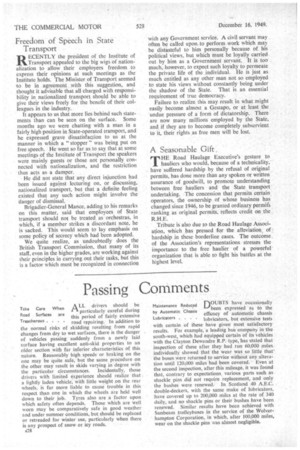Freedom of Speech in State Transport R ECENTLY the president of
Page 30

If you've noticed an error in this article please click here to report it so we can fix it.
the Institute of Transport appealed to the big wigs of nationalization to allow their employees freedom to express their opinions at such meetings as the Institute holds. The Minister of Transport seemed to be in agreement with this suggestion, and thought it advisable that all charged with responsibility in nationalized transport should be able to give their views freely for the benefit of their colleagues in the industry. It appears to us that more lies behind such statements than can be seen on the surface. Some months ago we were chatting with a man in a fairly high position in State-operated transport, and he expressed grave dissatisfac,tion to us at the manner in which a " stopper " was being put on free speech. He went so far as to say that at sonic meetings of the Institute of Transport the speakers were mainly guests or those not personally connected with nationalization, and the restriction thus acts as a damper. He did not state that any direct injunction had been issued against lecturing on, or discussing, nationalized transport, but that a definite feeling existed that any such action might involve the danger of dismissal. Brigadier-General Mance, adding to his remarks on this matter, said that employees of State transport should not be treated as orchestras, in which, if a member strikes a discordant note, he is sacked. This would seem to lay emphasis on some policy of secrecy which had been adopted. We quite realize, as undoubtedly does the British Transport Commission, that many of its staff, even in the higher grades, are working against their principles in carrying out their tasks, but this is a factor which must be recognized in connection with any Government service. A civil servant may often be called upon_to perform work which may be distasteful to him personally because of his political views, but which must be loyally carried out by him as a Government servant. It is to much, however, to expect such loyalty to permeate the private life of the individual. He is just as much entitled as any other man not so employed to state his views without constantly being under the shadow of the State. That is an essential requirement of true democracy. Failure to realize this may result in what might easily become almost a Gestapo, or at least the undue pressure of a form of dictatorship. There are now many millions employed by the State, and if they are to become completely subservient to it, their rights as free men will be lost.
A Seasonable Gift.
THE Road Haulage Executive's gesture to hauliers who would, because of a technicality,' have suffered hardship by the refusal of original permits, has done more than any spoken or written assurance of goodwill, to promote understanding between free hauliers and the State transport undertaking. The concession that permits certain operators, the ownership of whose business has changed since 1946, to be granted ordinary permit's ranking as original permits. reflects credit on the R.H.E.
Tribute is also due to the Road Haulage Association, which has pressed for the alleviation, of? hardship in these borderline cases. The outcome. of the Association's representations stresses the importance to the free haulier of a powerful' organization that is able to fight his battles at the highest level.




























































































